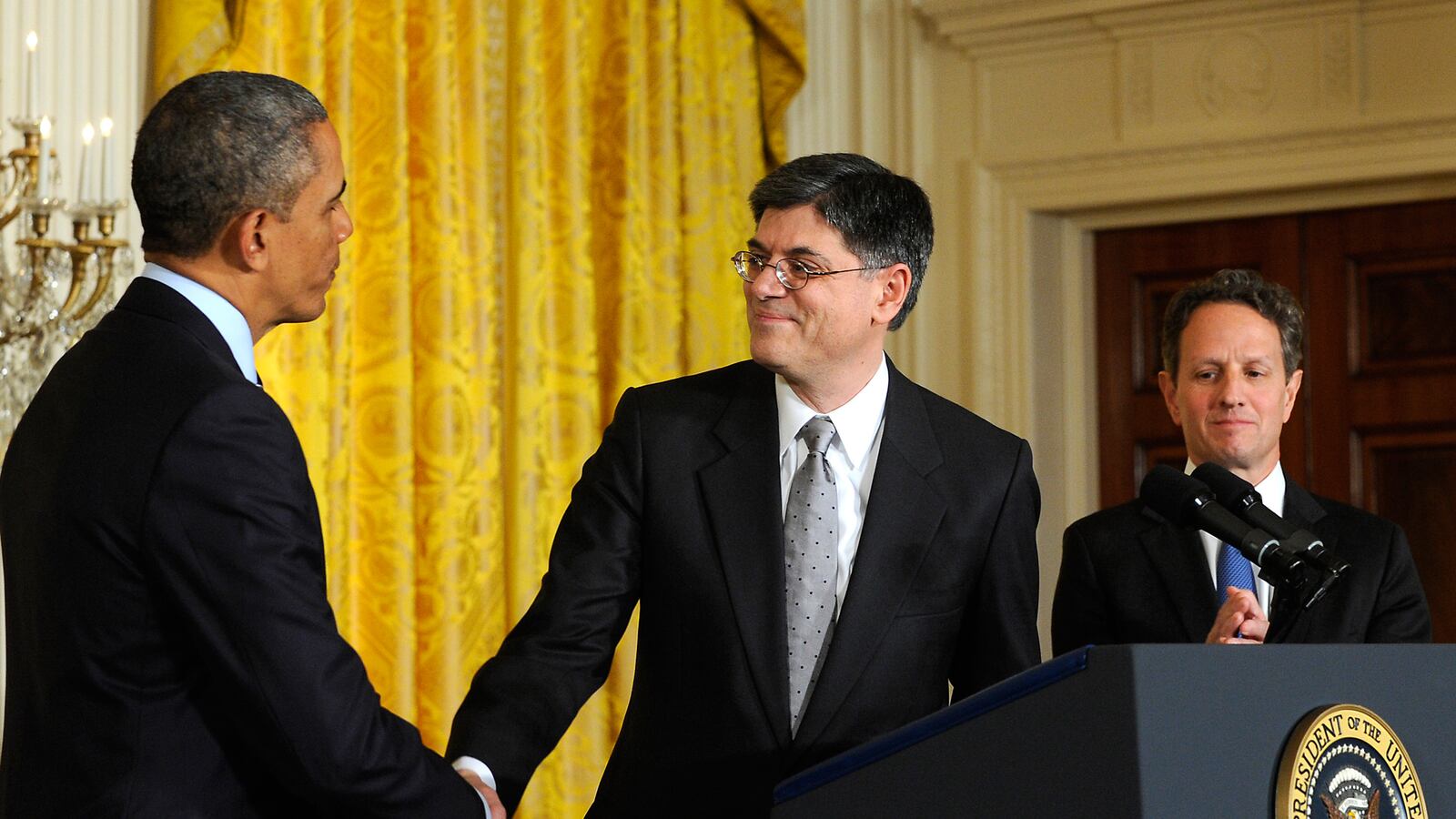So Jack Lew is going to be our new Treasury Secretary. He’s certainly got the experience to qualify him for the job; he’s been working in DC policy circles, on and off, for decades. And he has been a trusted Obama advisor for some time.

And yet, this Noam Scheiber column on his nomination gives me pause, both because of what it reveals about Lew’s thinking, and because of what it may reveal about where the administration is headed. Here’s Scheiber’s celebration of Lew’s role in the budget process:
By nominating Jack Lew to succeed Geithner, it may look like the president has substituted one technocrat for another. Lew is a two-time White House budget director and 30-year Washington veteran whose formative professional experience was helping Tip O’Neill bring Social Security into actuarial balance in a deal with Ronald Reagan. (He was all of 27 at the time.)
In fact, Lew has a well-deserved reputation for homing in on the values that lurk behind the numbers. Progressives in and out of government in the late 1990s recall him as one of the key defenders of Medicare and Medicaid from the designs of axe-wielding Republicans. “There was no bigger supporter,” one liberal policy maven told me. “He saved Medicaid.” More recently, as a top Obama emissary to the deficit negotiations of the last few years, he’s been dogged in his insistence that Democrats won’t entertain the tiniest pinprick to these programs unless Republicans put revenue on the table.
That, I’d guess, is half the reason Republicans have reservations about him (at least to the extent their reservations are sincere rather than a crass play for leverage). The other half is that Lew is just plain effective. During Obama’s first confrontation with the House GOP in early 2011, John Boehner’s troops were bent on lopping $100 billion off Obama’s budget request for that year, an eye-popping sum to squeeze out of a weak economy. Obama, with Lew as his chief negotiator, eventually compromised at $78 billion, which looked at first like a massive concession, but was a pretty favorable outcome once you read the fine print. As it happened, Lew was able to produce a “headline” number that was large and pleasing to the GOP but ultimately rather meaningless: He’d conjured up cuts to piles of money that weren’t going to be spent anyway, and handed them over to Republicans wrapped in pretty little bows. “Boehner and his guys got snookered by [Obama congressional affairs liaison] Rob Nabors and Jack Lew,” a senior White House official told me while I was writing a book on the subject. “We protected what we wanted to protect.”
Perhaps not surprisingly, GOP leaders have repeatedly petitioned the White House to send someone other than Lew to join them at the bargaining table. Which points to at least one reason to love his nomination: It’s an instance of Obama emphatically not allowing Republicans to choose their negotiating partner, a rule he hasn’t always observed.
If it is really true that the president has chosen Lew to teach Republicans a lesson, I find that disturbing, not exciting. The negotiating tactics that Scheiber describes may be good for some high-fives in the White House, but they strike me as exactly the sort of short-term, partisan thinking that has led to the Great Coin Caper. Every sales executive I’ve ever interviewed can tell you a story like this: the incredibly slick deal where you really put one over on the other side with a fine piece of fast talking. That story almost invariably ends in the salesman getting fired.
Why? Because you cost yourself a customer in order to make a one-time deal. Door-to-door salesmen or infomercial spokesmen can afford to sell you a $19.99 “Universal Clothes Hanger” that turns out to be a nail. You’ll never see them again, after all. But a salesperson with a reputable business cannot afford to rubber-hose the customer so thoroughly that he takes his custom somewhere else. This is a lesson that most salesmen have to learn, with more or less degrees of pain.
That’s not to say that salesmen are some sort of angels who only have the customer’s best interests at heart. They’ll charge as much markup as they can, upsell you to products you really don’t need, and (say the engineers, through gritted teeth), oversell what the product can actually do. In The Big Short, Michael Lewis has a lot of fun with the legendary (alleged) propensity of Goldman Sachs traders to do deals which take their customer for a ride in some clever, opaque way. But even they do not deliberately and openly screw the customer in a way that the customer can obviously detect, or else, they quickly stop having customers. Shortly after that, they stop being sales people.
If I recall correctly, in this case, the administration immediately started crowing to the press about their clever, tricksy deal, just in case Republicans hadn’t noticed that they’d been snookered. I’m sure that this played great with the base, but it threw fuel on a fire that was already well stoked. And for what? This wasn’t in the context of a debt ceiling negotiation, where the administration could legitimately say that it had to do anything to keep the cash flowing; this was a routine budget negotiation with the new Republican congress. Handling it this way distressingly myopic. The administration enthusiastically traded winning the future for a picayune present gain.
Of course, there are undoubtedly many other reasons that the president chose Lew, and there’s every possibility that he will turn out to be a fine Treasury secretary. I had reservations about Geithner when he took office, but Geithner ended up being an excellent choice for the job. Hopefully, I will be wrong about this, as well.






